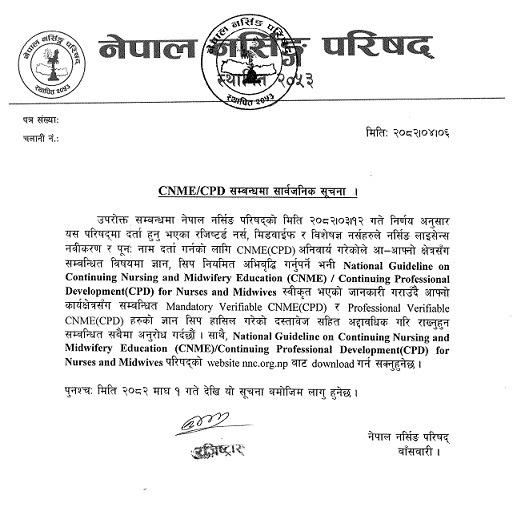
Nepal Nursing Council Implements New CPD System
The Nepal Nursing Council has introduced a new system of Continuing Professional Development (CPD).
Starting from 1 Magh, 2082, the CPD program will be implemented for nurses and midwives to enhance their knowledge, skills, and professional competence.
Key Highlights
|
According to the new provision, licenses will not be renewed unless nurses complete a minimum of 60 hours of training within six years. This provision has been brought after the implementation of CPD.
The Council stated that from now on, nurses must earn CPD credit points to renew their licenses.
Until now, nursing licenses were renewed every six years simply by paying a prescribed fee. But under the new system, knowledge and skills must be updated for renewal.
The Council explained that this program has been introduced to further refine the knowledge and skills of nurses, reduce misunderstandings between nurses and patients, prevent and control infections, and ensure continuous professional improvement.
Nurses will be required to complete 60 to 120 hours of training within six years. The health institution or educational institution where they are employed must provide the training.
The Council said, “When nurses obtain a license but do not practice, their knowledge gradually diminishes, which directly affects public health. That is why nurses must now earn at least 10 credit points annually and 60 credit points in six years.”
Training topics will include communication skills, basic life support, infection prevention and control, medical ethics, and knowledge enhancement.
This will help establish Nepalese nurses as competent professionals both nationally and internationally.
The Council clarified that credit points can be obtained by participating in training, workshops, seminars, research programs, and continuing nursing education conducted by hospitals. National and international workshops, seminars, assemblies, and conferences will also be recognized.
The Council has already communicated with health and educational institutions. Specific provisions have been set on the types of training required.
Only training conducted by educational institutions, health institutions, or the National Health Training Center will be recognized.
Since evaluation will be based on skills, experience, achievements, and active participation, nurses will not have to bear any financial burden for this.
The Council has published details of available credit points for various training and programs on its website.
It was noted that once learned, knowledge cannot remain valid forever because the medical profession constantly changes and updates. Therefore, skills must be refined from time to time.
The Council decided to reform the inactive system of license renewal based only on fees.
The Council said, “This provision will motivate nurses to learn new knowledge and skills and ultimately improve the quality of patient care.”
Under this system, nurses will have to participate in training, orientation, and refresher courses.
It was mentioned that nurses cannot rely only on what they studied years ago. New treatments, technologies, and medicines keep emerging, so they must remain updated.
To make this process effective, the Council has also emphasized that hospitals and educational institutions should take responsibility.
The Council remarked, “Private hospitals do not even pay nurses ten thousand in salary, so institutions themselves must send them for training. Only then can people receive quality healthcare.”
After Dashain–Tihar, orientation programs will be conducted in hospitals and educational centers across different provinces.
The Council’s long-term goal is to keep nurses updated daily and ensure quality healthcare delivery.
The Council said, “It is not enough to provide nurses with tools; they must also know how to use them. Only then will people benefit.”
According to the Council, this training will address behavioral and technical weaknesses seen in health services and make health workers more competent.
It was added that the plan is designed to also be convenient for health workers serving in remote areas.
Training will focus on technical skills and improving communication between health workers and patients.
There have been complaints that health workers do not communicate well with patients in health institutions. To address this, communication skills have been made a key part of the training.
The Council said, “This program is designed to develop communication skills, so the gap between patients and nurses will be reduced.”
According to Council statistics, so far 86,157 nurses, 37,764 ANMs, 133 midwives, 1,870 specialists, and 856 foreign nurses have received licenses in Nepal.
Among them, only 36,334 nurses and 15,301 ANMs have renewed their licenses.
However, the Council does not have accurate data on how many nurses are active or working abroad.
With the implementation of the CPD program, the Council also plans to update official statistics on the number and location of nurses working in Nepal.
Training will also include preventing common mistakes while using stretchers, wheelchairs, and other equipment to ensure safer services for patients.
The Council noted that many nurses working abroad for jobs do not seek approval, so there is no accurate record of how many are abroad.
Before going abroad for study, nurses must get approval from the Council. But those leaving for jobs do not seek permission.
The Nepal Nursing Association estimates that only 45,000 nursing personnel are active in Nepal. Among them, about 18,000 are working permanently or on contract under the Government of Nepal, about 17,000 in private hospitals, and the rest in educational institutions. Around 30,000 nurses are estimated to be unemployed, while about 20,000 have taken verification for foreign employment.
To make training more practical, the Council has prepared various mandatory modules.
These include video materials, technical practice models, and hospital-based learning processes.
The Council said, “As this is a digital era, we are preparing to upload videos and provide online materials as well.”
According to the Council, this training will be implemented long-term to improve the skills and behavior of nurses and health workers. Ultimately, it will help patients receive quality services.
The Council also claimed that training will be accessible free of cost and conveniently even for nurses working in remote and rural areas.
The Council added, “This is just the beginning. There may be some problems at first, but we will keep improving continuously based on feedback.”



